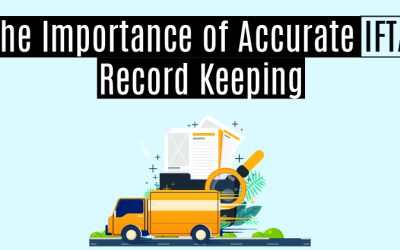
If you are reading this, your business is most likely about transportation and consists of commercial trucks. Then, you must have heard of IFTA (International Fuel Tax Agreement). Nowadays, most people are confused and do not understand what IFTA is and how they can generate their IFTA report. In this article, you will learn all about IFTA.
What is IFTA?
IFTA (International Fuel Tax Arrangement) is a cooperative agreement between 48 states in the United States and ten provinces in Canada. It allows inter-jurisdictional carriers to report and pay taxes on their Vehicle’s fuel across states using a single fuel tax license.
IFTA requires Inter-jurisdictional carriers to report :
- The amount of motor fuel purchased and the amount of fuel that would have been consumed.
- The distance traveled in each jurisdiction
Taxes on motor fuels such as gasoline, diesel, propane, gasohol, methanol, ethanol, natural gas, and biodiesel are tracked, collected, and shared by member states.
IFTA is one of the many regulations that commercial trucks owners must be aware of to ensure legal activities.
Six jurisdictions, however, are not IFTA members. As a result, IFTA credentials will not be accepted. Alaska, Hawaii, and the District of Columbia in the United States and the Northwest Territories, Nunavut, and Yukon Territory in Canada. Mexico is also not a signatory to the IFTA pact.
All miles driven in these places should be reported in the IFTA report as non-IFTA miles. As a result, these miles are taxed differently.
What is an IFTA report?
The IFTA fuel tax report is a quarterly filing that calculates fuel taxes over paid or under paid. This information is then used to shift taxes to the correct jurisdictions.
Am I eligible for IFTA?
If your motor vehicle is used or designed to move people or property, it probably must be registered under the IFTA. Specifically:
- If you have three or more axles
- If you have two axles and a gross vehicle or registered a gross car that weighs more than 26,000 pounds or 11,797 kilograms
- If your vehicles are used in combination with a combined gross vehicle weight of more than 26,000 pounds or 11,797 kilograms.
- If you have a bus capable of transporting at least 20 passengers (less relevant to trucking companies).
It is important to note that some fleets fit this description yet do not require an IFTA license, such as intrastate fleets.
These fleets must run on diesel, propane, or natural gas to be eligible for IFTA tax reporting.
How do I file an IFTA report?
There are three ways to file your IFTA report:
- In-person: When your return is brought to the office, it is considered received.
- Electronically: When you submit your return electronically, it is considered received on the date it is sent.
- Via mail: Make sure your envelope’s postmark date is on or before the last date to file.
What do I include in an IFTA report?
If a fleet is eligible to obtain an IFTA license, the application must be completed in the member jurisdiction where the fleet operates. Some information that must be included:
- Your registered business name
- Your Postal address
- Your USDOT number (federal business number)
The application for an IFTA license can be downloaded from the internet. Some jurisdictions require these documents to be mailed, while others accept them through fax or at a taxpayer services office. After their IFTA application has been processed, trucking fleets can be issued a temporary license while they wait for their permanent support and decals to arrive in the mail.
What are the IFTA due dates?
- For Q1 (January to March): April 30
- For Q2 (April to June): July 31
- For Q3 (July to September.): October 31
- For Q4 (October to Dec.): January 31
If that day is a weekend or a holiday, then reports are due the next business day.
Fuel tax rates in each US state (Gasoline)
AL – 0.2600
AR – 0.2450
AZ – 0.1800
CA – 0.0000
CO – 0.2200
CT – 0.2500
DE – 0.2300
FL – 0.3570
GA – 0.2870
IA – 0.3000
ID – 0.0000
IL – 0.5010
IN – 0.3100
KS – 0.2400
KY – 0.2460
LA – 0.0440
MA – 0.2000
ME – 0.0000
MI – 0.3830
MN – 0.2850
MO – 0.1700
MS – 0.1800
MT – 0.0000
NC – 0.3610
ND – 0.2300
NE – 0.2870
NH – 0.0000
NJ – 0.5070
NM – 0.0000
NV – 2300
NY – 0.3840
OH – 0.3850
OK – 0.1900
OR – 0.000
PA – 0.5760
RI – 0.3400
SC – 0.2400
SD – 0.0000
TN – 0.2600
TX – 0.2000
UT – 0.3140
VA – 0.2120
VT – 0.0000
WA – 0.4940
WI – 0.3290
WV – 0.3570
WY – 0.2400









